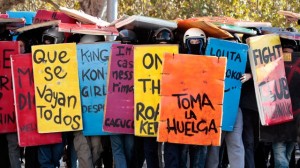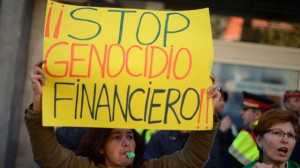
Demonstrators face police during a protest against Italian Government austerity measures in Rome earlier this month. Protesters clashed with police in various demonstrations in Rome, Milan, Turin, Padua and Brescia. (AP Photo/Gregorio Borgia)
But amidst all the protest and the economic emergency throughout much of Europe, what perhaps was most compelling during our brief visit was the mortgage crisis in Spain and how some politicians, financial institutions and the people there are responding in ways many Americans would like to see more often here at home.
Since 2008, according to freelance journalist Dan Hancox, writing in The New Inquiry, 400,000 Spanish homes have been repossessed, 50,000 in the first six months of 2012. More than three million properties are empty. Last month, unemployment stood at 25 percent – with youth joblessness at 52 percent: “The IMF cheerily predicts Spain – a country of fewer than 50 million – will hit the 6 million unemployed mark next year.” Even more will be unable to make their mortgage payments.

People protest against evictions in Barcelona, Spain, earlier this month. Spanish officials are opening talks aimed at creating new regulations governing the eviction of indebted homeowners, after the suicide of two people about to suffer that fate shocked the nation. The banner reads: Stop financial genocide. (AP Photo/Manu Fernandez)
That same day, as reported by El Pais, Spain’s largest newspaper, “…the city of Santa Cruz de Tenerife managed to get Bankia [the Spanish banking conglomerate] to temporarily halt all local evictions by the simple technique of withdrawing 1.5 million euros from the lender, which was nationalized earlier this year to avoid bankruptcy.” Egana’s suicide also “led to a temporary freeze on all evictions by Kutxabank, a merger of three Basque banks. Another regional lender, Caja Laboral Ipar Kutxa, previously decided to do the same.”
What’s more, “… the Unified Police Union (SUP) announced it would back officers who refuse to participate in an eviction on ethical grounds, even providing them with legal defense if necessary.”
All of this was fueled in part by action from the street:
“Public protests against the banks grew in intensity… after Amaya Egaña’s death was reported by the media. Thousands of people took part in a spontaneous march in Barakaldo, the town where the former Socialist councilor lived, and over the weekend several bank branch offices were spray-painted with the word ‘Murderers.’”
The demonstrations were connected to what our friend and colleague Amy Goodman describes as “a direct-action movement” in Spain aimed at preventing the “epidemic of evictions”:
“…In city after city, individuals and groups have networked, creating rapid-response teams that flood the street outside a threatened apartment. When officials arrive to deliver the eviction notice, they can’t reach the building’s main door, let alone the apartment in question.”
A few days later, Sharon Smyth at Bloomberg Businessweek reported movement from the Spanish government: “Banks won’t be able to remove families who can’t pay their mortgages for two years, Deputy Prime Minister Soraya Saenz de Santamaria said… after the government’s weekly cabinet meeting in Madrid. The rules apply to households earning less than 1,597 euros ($2,041) per month combined with certain other conditions such as young children in the property…
“Under the terms of the agreement, families that aren’t paying their home loans also have to meet another condition to qualify. These include having at least three children; having one child under three; having a disabled dependent to look after; being a single parent with two children or a victim of domestic violence; or being unemployed and not receiving benefits.”
In a country which traditionally has had some of the most repressive mortgage laws in Europe, it’s a start. Trouble is, the freeze is not retroactive, so as Dan Hancox notes, “This does little to help the families of the deceased, or the people camping outside the same banks that repossessed their homes.”
Meanwhile, back in the States, RealtyTrac reports that the foreclosure rate in October was up three percent from September. Last week, American Pubic Media’s Marketplace examined “groups across the country… trying to change that by buying underwater mortgages and keeping families in their homes.” You can listen to their report or read it here.

